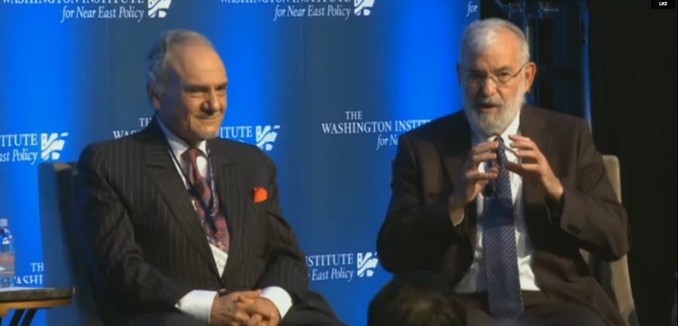Former high-ranking security officials from Israel and Saudi Arabia made a rare joint appearance in Washington on Thursday night, underscoring the quiet but steady cooperation between the two nations.
Prince Turki al-Faisal, the former Saudi intelligence chief and ambassador to the United States, and IDF Maj. Gen. (ret.) Yaakov Amidror, the former Israeli national security adviser, appeared at the Washington Institute for Near East Policy for a moderated discussion that touched on possible peace agreement between Israel and the Palestinians as well as the regional threat posed by Iran.
Though the talk was genial, there were clearly differences between the two. The prince insisted that the 2002 Arab Peace Initiative was the necessary path to achieve peace between Israel and the Palestinians. “There is no requirement for divine revelation or Einsteinian genius to know what peace is — two states, mutual swaps, mutual recognition, and engaging with each other,” he said. He also acknowledged quiet Saudi cooperation with Israel, and stated that such cooperation would be enhanced and more public if an Israeli-Palestinian peace was reached.
Amidror responded that it wasn’t Israel at fault for the lack of peace, but rather Palestinian Authority President Mahmoud Abbas and the PA, who rejected a number of proposals from multiple Israeli governments. Instead of mandating specific parameters for an agreement, Amidror countered, the Arab world should “cooperate with Israel instead of dictating to Israel,” which would bring “both sides under an umbrella to negotiate.”
On the subject of the threat from Iran, Prince Turki stated has nation would consider “all options,” including the acquisition of nuclear weapons capability, if Iran were to develop its own nuclear weapons. Amidror said that he expected Iran will develop a bomb “toward the end of the agreement. In principle, the Iranians can go nuclear and from the Israeli point of view, this is a threat to existence, and we will not let this happen.”
When it comes to the Saudi-American relationship, Prince Turki said, the “strategic relationship with the U.S. will remain, from the Saudi point of view,” though he added that “there needs to be a reevaluation and recalibration of the relationship…Americans feel too much used to be expected of them. And they shouldn’t feel obliged to take certain responsibilities that they did before.”
Amidror took a different approach, saying that there is “no substitute for the United States of America in the Middle East,”adding that those “who think other countries can do what the United States used to do is a big mistake.”
A similar public discussion between Saudi and Israeli leaders took place at the Council on Foreign Relations last July, featuring former Saudi general Anwar Eshki and Dore Gold, who is now the director-general of the Israeli Foreign Ministry. That talk largely focused on their shared concern over Iran’s intentions to dominate the Middle East.
Another sign of recent Israeli-Saudi cooperation was the recent agreement by Egypt to return two islands in the Red Sea to Saudi Arabia, in which Saudi Arabia accepted Israel’s shipping rights. This was seen by regional observers as another step in strengthening regional cooperation against the Iranian threat.
A recording of the forum is embedded below.
[Photo: Washington Institute for Near East Policy ]




